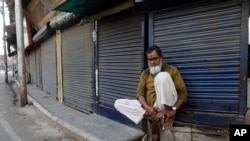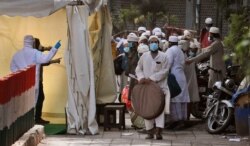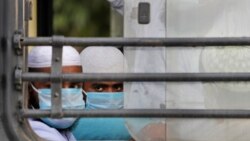As the coronavirus outbreak spreads around the world and countries take various measures to contain it, the pandemic in India is causing an increase in incidents of COVID-19-related discrimination against the country's minority Muslims.
India’s Health Ministry announced last week that 30 percent of coronavirus cases were linked to a meeting in March of the Tablighi Jamaat, a Muslim missionary group, in Delhi. The country’s Muslim minority population has since witnessed a string of attacks by Hindu extremists, accusing the Muslims of “corona jihad.”
Some India observers say linking the virus to the Muslim organization could result in more religious hatred in the country, warning that the effects of Islamophobic conspiracy theories could sow violence even after the pandemic.
“Blaming Muslims for spreading coronavirus all over India is dangerous and discriminatory,” said Muqtedar Khan, a professor of Islamic political philosophy at the University of Delaware and an India expert at the Center for Global Policy.
“The lax attitude of the Indian government allowed the Tablighi Jamaat to continue their activities. There are laws in India; the point is that they are using them only against the Tablighis and they are not trying to go after any Hindu group at all,” Khan said, adding that the nationalist media have also played a role in spreading accusations that Muslims were responsible for the spread of the virus throughout the country.
As of Friday, India had recorded more than 13,800 cases of COVID-19, with at least 442 deaths, according to Johns Hopkins University statistics. The country has been on an official lockdown to combat the virus since March 24. However, some officials blame the Tablighi Jamaat for the coronavirus’ early spread.
An estimated 1,500 to 2,000 people attended the missionary group’s annual meeting, which was held March 13-15 at its headquarters in the West Nizamuddin area of Delhi. Cleric Maulana Saad Kandhalvi, head of the group, has since been charged with violating government-issued coronavirus guidelines, culpable homicide and money laundering.
Vikas Swarup, a senior official at India’s ministry of external affairs, in a press briefing last week said the government of Prime Minister Narendra Modi “was compelled to call out this congregation.”
However, some experts say there is a problem with the statistical accuracy of the government claims.
“Since most of India has not been tested, there is no real accuracy of the denominator,” said Alyssa Ayres, a Washington-based senior fellow for South Asia at the Council on Foreign Relations.
‘Scapegoating of religion’
Ayres said she was concerned by the “scapegoating of religion” in the South Asian country, where a decades-long conflict between the majority Hindus and minority Muslims has seen a surge in recent years.
“There are challenges of large gatherings happening around the world," and it seems the Tablighi Jamaat group is being singled out in India, Ayres said last week during a panel about the country’s response to the pandemic. "But it is happening, and that is something that I think we should all be concerned about."
Local media in recent weeks have reported an uptick in bullying and harassment leading to three reported cases of suicide and loss of wages due to boycotting of Muslim-owned businesses. Mehboob Ali, 22, last week was beaten by a Hindu mob in the village of Bawana, outside Delhi, after he was accused of intentionally spreading the virus among non-Muslims. In another incident, young Muslim activists distributing food to those in need were assaulted with cricket bats.
Some analysts say such communal violence is likely to continue as the number of confirmed coronavirus cases rises and Hindu nationalists continue to allege Muslims are responsible.
Ashok Swain, a professor of peace and conflict studies at Uppsala University in Sweden, said the Indian government had “taken a number of missteps in addressing the threat of a pandemic.”
As such, the authorities are likely trying to shift the blame and portray the pandemic as a part of communal conflict, he charged.
“The aim is to give the corona crisis a communal color, which will give the regime an escape route from its abject failure and also at the same time the increasing anti-Muslim environment will bring them political benefits in the future,” Swain told VOA.
On April 7, M.P. Renukacharya, a lawmaker in Karnataka and member of the legislative assembly for Bharatiya Janata Party (BJP), told local media that Tablighi Jamaat members were spreading COVID-19 “like terrorism.”
A day later, Devendra Fadnavis, a senior BJP leader and former Maharashtra chief minister, called those who had attended the religious meeting “human bombs.”
Meanwhile, the opposition Indian National Party Congress, led by Sonia Gandhi, has refrained from making any statements on the Tablighi Jamaat incident.
Hindu congregations
Faizan Mustafa, a professor of constitutional law in Hyderabad, said the Tablighi Jamaat were “irresponsible” and exhibited “reckless behavior” by holding the large gathering. However, he also said that Hindu groups that held similar meetings had faced no criticism from the government.
“Most temples remained open till March 18, and some even till March 20. Several other religious worships happened after that. Just last week, 1,800 Gujrati Hindus who were stranded in Haridwar were sent to their homes in 28 luxury buses, but this kind of facility was not given to [the] Tablighis,” Mustafa said, citing several mass gatherings in Hindu temples throughout India.
“Tirupati Temple was open to the public till 16th of March, where there are an estimated 30,000 to 40,000 visitors per day — at least 4,000 people praying at a time every hour. In Somanth Temple, visitors of up to 5,000 per day were reported till the 18th of March. And Kashi Visnath Temple was also open until March 20,” Mustafa said, citing local reports.






